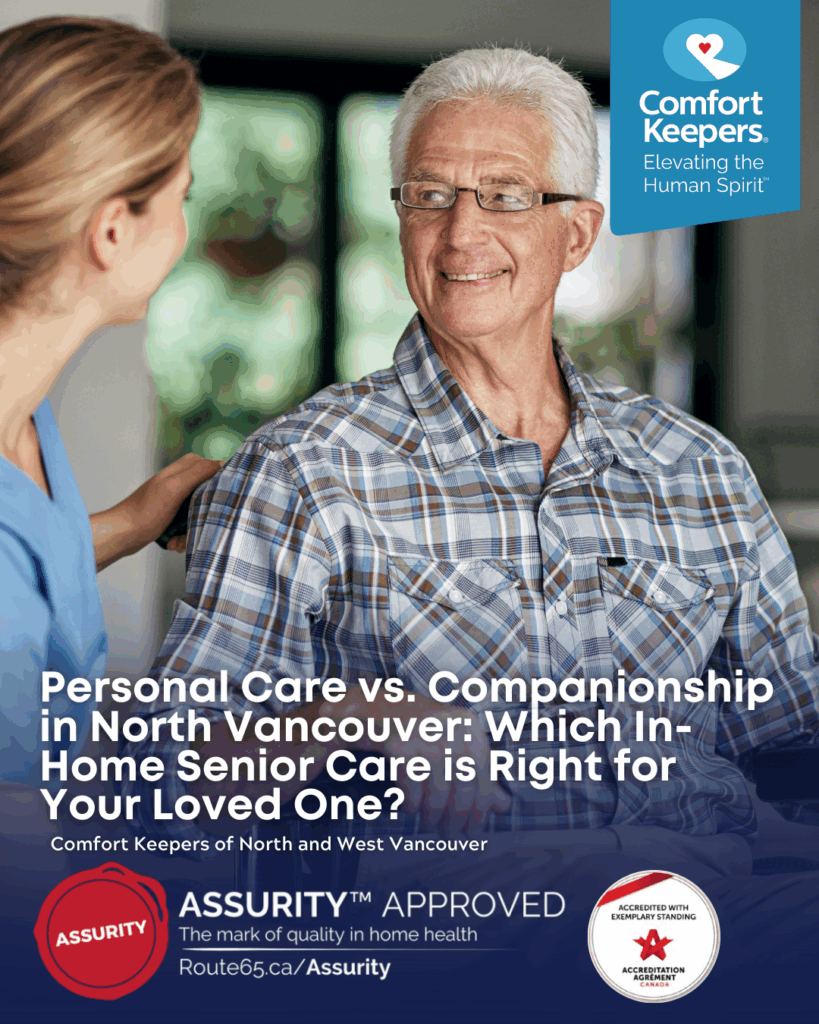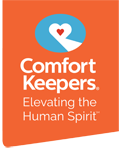Personal Care vs. Companionship in North Vancouver: Which In-Home Senior Care is Right for Your Loved One?
Interactive Caregiving | August 18, 2025
Making the right care decision for a loved one can feel overwhelming. You’re navigating a world of new terminology while balancing the deep responsibility you feel for their well-being. If you’re weighing options like personal care and companion care, you’re not just looking for definitions – you’re looking for clarity and confidence. You’re in the right place.
This guide is designed to move beyond generic descriptions and give you a simple, professional framework to help you confidently determine the exact level of support your loved one needs.

The Foundational Question: What Help Do They Truly Need?
Before you can choose a service, you must accurately assess the need. In professional home care, we do this by looking at two distinct categories of daily tasks:
- Activities of Daily Living (ADLs): These are the fundamental self-care tasks essential for a person’s health and safety. Think of these as the core activities required to get through the day.
- Instrumental Activities of Daily Living (IADLs): These are the more complex tasks required to live independently within a community. They involve managing a household and interacting with the outside world.
Understanding the difference between ADLs and IADLs is the single most important step in choosing the right type of care. Let’s break down what that means for your family.
Personal Care: Essential Hands-On Support for Daily Living (ADLs)
Personal care is hands-on, physical assistance with Activities of Daily Living (ADLs). This type of care is for seniors who have difficulty with the essential tasks of self-care due to mobility issues, cognitive decline, or physical frailty. It is a direct intervention to ensure their safety and physical well-being.
This level of care is crucial for preventing injuries. According to research published in The Gerontologist, over 34% of older adults report falling each year, and a fall can be a life-altering event that threatens their independence. Professional personal care directly mitigates this risk.
A personal care plan typically includes help with:
- Bathing and Grooming: Assisting with showering, dressing, and personal hygiene to maintain dignity and health.
- Mobility Assistance: Helping your loved one move safely around the home, transfer from a bed to a chair, and reduce the risk of falls.
- Toileting and Incontinence Care: Providing compassionate and respectful assistance with one of the most sensitive aspects of personal care.
- Positioning and Transfers: Ensuring proper body positioning to maintain skin integrity and comfort for those who are bed-bound.
- Feeding Assistance: Helping with the physical act of eating when a senior is unable to do so independently.
Companion Care: Fostering Independence and Well-Being (IADLs)
Companion care focuses on Instrumental Activities of Daily Living (IADLs) and, just as importantly, on emotional health and social engagement. This type of care is ideal for a senior who can manage their basic personal care (ADLs) but needs support with the tasks that keep their household running and their spirits high.
Struggles with IADLs are often the first signs your elderly parent may need assistance at home. Companion care acts as the frontline defense against senior isolation, which can have health impacts as serious as smoking or obesity. It’s about ensuring a safe environment and providing meaningful social connection – something that an astounding 90% of seniors who prefer to age at home desperately need to thrive.
A companion care plan often includes help with:
- Meal Preparation: Planning and cooking nutritious meals, which is vital for maintaining energy and cognitive health.
- Light Housekeeping: Assisting with laundry, vacuuming, and tidying up to ensure a safe and pleasant living space.
- Errands and Transportation: Providing transport to appointments, the grocery store, or social outings.
- Medication Reminders: Helping your loved one stay on track with their prescribed medication schedule.
- Companionship and Activities: Engaging in conversation, playing games, going for walks, and simply being a friendly, reassuring presence to support the importance of social interaction for seniors living alone.
At-a-Glance: Personal Care vs. Companion Care
Sometimes a simple chart makes the distinction clearest. Use this as a quick reference as you evaluate your loved one’s situation.
The Comfort Keepers Difference: Care That’s More Than Just a Task List
The reality of care is that needs are rarely confined to one box. A senior who needs personal care for bathing also needs the dignity of conversation. A senior who needs companion care for meals also needs someone who ensures they are moving safely around the kitchen.
This is where a holistic approach becomes essential. At Comfort Keepers North & West Vancouver, we don’t see personal care and companion care as separate silos. We deliver both through our unique philosophy called Interactive Caregiving™.
Interactive Caregiving™ transforms routine care tasks into opportunities for connection and engagement. When our caregiver helps your mom get dressed, they are also talking with her about her day and encouraging her to do as much as she safely can for herself. When they prepare a meal, they might invite your dad to help wash vegetables or set the table.
This approach ensures that every interaction is built on respect, purpose, and connection – elevating the human spirit while providing for physical needs. It’s the difference between a task list and true, compassionate care.
Frequently Asked Questions
1. Can we combine personal care and companion care services?
Absolutely. In fact, most clients benefit from a blended approach. Needs are dynamic, and the best care plans are flexible, incorporating hands-on help where needed and companionship throughout every visit.
2. What happens if our loved one’s needs change over time?
This is a normal and expected part of the aging journey. At Comfort Keepers, care plans are not static. We conduct regular assessments and maintain open communication with you and your loved one to adjust the level and type of care as needs evolve.
3. Is in-home care covered by provincial health plans or private insurance?
Coverage varies significantly. While provincial plans may cover some aspects of medical home care, non-medical personal and companion care are often paid for privately. Some long-term care insurance policies do provide coverage, and it’s always best to check with your specific provider. We can help you understand the options during a consultation.
4. How are Comfort Keepers caregivers trained for these specific needs?
Our caregivers undergo a rigorous screening, hiring, and training process. They are trained in all aspects of personal and companion care, including safety protocols, dementia care, and our Interactive Caregiving™ philosophy. This ensures they have both the hard skills and the compassionate approach to provide exceptional care.
5. What’s the difference between hiring an agency like Comfort Keepers vs. a private caregiver?
When you work with an agency like Comfort Keepers, you are getting more than just one person. You get a professionally managed, fully insured, and bonded care team. We handle all scheduling, find replacement caregivers if someone is sick, manage payroll, and provide ongoing supervision and training. This provides a level of reliability, safety, and peace of mind that can be difficult to achieve when hiring privately.
Taking the Next Confident Step
You’ve taken the time to understand the nuances of in-home care, and you now have a framework to assess your family’s needs. With approximately 70% of Canadians aged 65 and older requiring some form of care, making this decision is a proactive and loving step.
Comfort Keepers North and West Vancouver Can Help
The next step is a simple conversation. We invite you to schedule a free, no-obligation care consultation with our team in North & West Vancouver. We can talk through your checklist, answer your specific questions, and help you design a care plan that brings comfort, joy, and independence back to your loved one’s life.
The Best Senior Home Care in North and West Vancouver is Comfort Keepers®
Our senior home care agency offers in-home care focusing on aging in place. Our services include dementia care, end-of-life care, post-surgery care, and palliative care. Comfort Keepers can assist seniors with living transition services, personal care, companionship care, and more!
Quality and Accredited Elderly Care: Happier, Healthier, and at Home with 24/7 Senior Care Opportunities!
Do you need a home care solution for yourself or a loved one? Have you been thinking about retirement homes and their alternatives as a solution? Comfort Keepers® enables seniors to maintain happy, healthy lives in the comfort of their own homes. In-home care services are available in North Vancouver, West Vancouver, and the surrounding areas.
Comfort Keepers® is a Senior Care Agency That Can Make a Difference with Interactive Caregiving™
Our in-home caregivers ensure our senior clients have the best quality of life. The Interactive Caregiving™ program ensures that a senior’s safety, nutrition, mental well-being, and everyday needs are met. This program brings joy and good health to each client’s home.
Comfort Keepers® North Vancouver and West Vancouver Can Help with In-Home Elderly Care Services!
If you are concerned about the health and well-being of a loved one we can help! Comfort Keepers offers 24-hour care and delivers top-quality and compassionate care for seniors. We are dedicated to safety technology solutions that foster independence and enhance well-being.
Locally Owned and Operated Home Health Care Agency
Our care centers around companionship for seniors. Empathetic care originates from the soul and allows us to meet our client’s requirements. The seasoned in-home caregivers employed by Comfort Keepers are carefully chosen based on their empathetic qualities.
Contact the Comfort Keepers® North Vancouver and West Vancouver office at (604) 998-8806 to learn more about our unique in-home care solutions for seniors.
Comfort Keepers is an Accredited Senior Care Agency in North and West Vancouver, BC
Accreditation is a rigorous process that involves industry experts evaluating an organization’s processes, policies, and procedures. Comfort Keepers® North and West Vancouver has been awarded Exemplary Standing by Accreditation Canada. This achievement recognizes that Comfort Keepers® meets or exceeds the stringent quality standards for Home Care companies established by Accreditation Canada.
Individualized Home Care Options
Long-Term Home Care, 24 Hour Home Care & Short Term Care Options Customized for You





